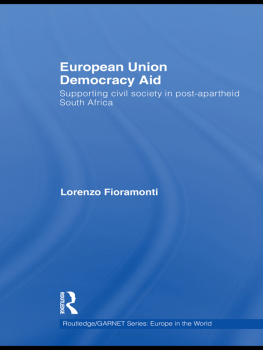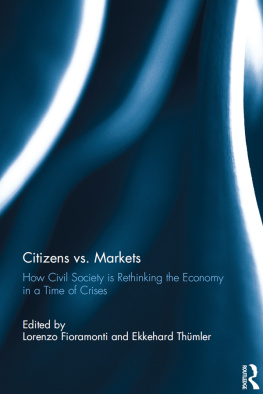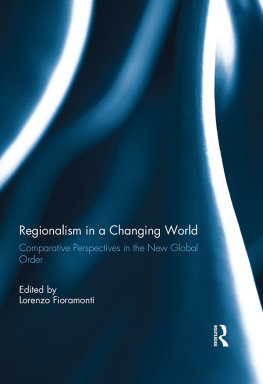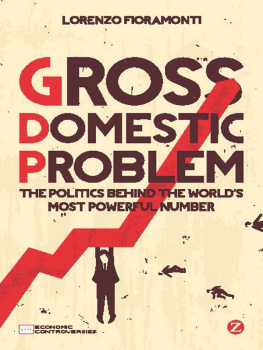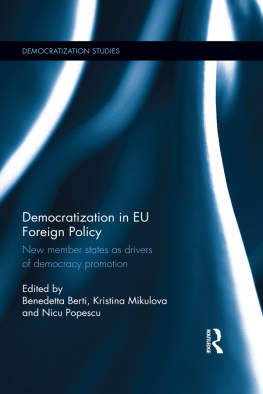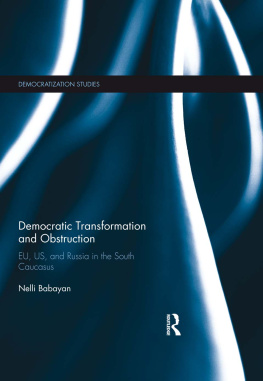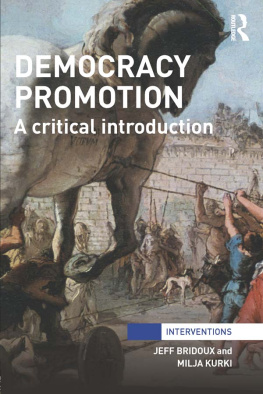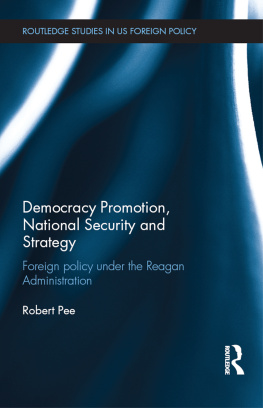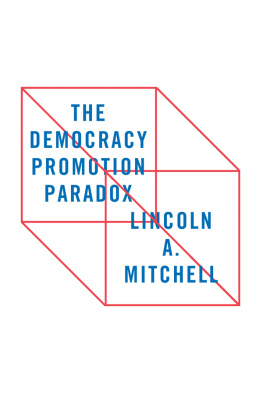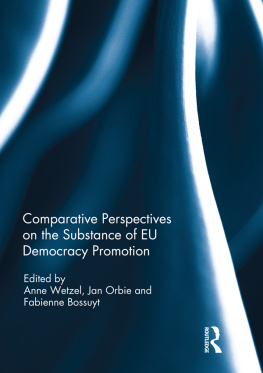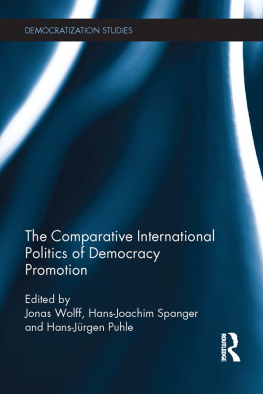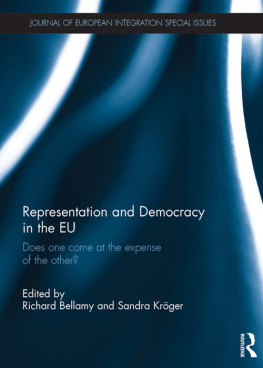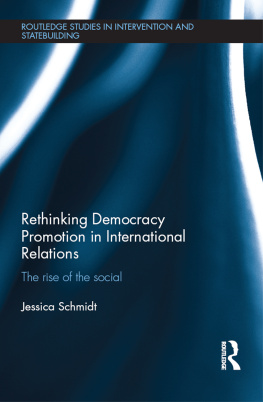European Union Democracy Aid
Since the end of the Cold War, the promotion of democracy has occupied centre stage in global politics and in the academic debate on international relations. Governments, intergovernmental agencies, and international donors have invested significant resources towards supporting the democratic consolidation of fledgling democracies. The European Union (EU), which is the largest aid donor in the world, has been no exception to this trend.
This book focuses on the development aid provided by the EU to the South African democracy during its first ten years of life. EU Democracy Aid is the first book to empirically analyse the EU policy towards South Africa, which has been the most longstanding and comprehensive European democracy promotion initiative in a single country and an important test-bed for the EUs effectiveness and credibility as a global democracy promoter. Building on the EUs declared goal to promote democracy from below, this study explores the potential of micro-level projects aimed at deepening democracy through grassroots civil society organizations operating in marginalized communities, where abusive and authoritarian practices often outlive the advent of democracy.
It will be of interest to students and scholars of civil society, democracy, economics, development studies, European Union studies, political sociology, and international relations.
Lorenzo Fioramonti, PhD, is Research Fellow in Euro-African Relations at the University of Pretoria (South Africa) and Fellow in International Relations at the University of Bologna (Italy). He is the author of numerous articles and book chapters on the European Unions external relations, civil society, democracy promotion, and international development. He is also the co-editor of CIVICUS Global Survey of the State of Civil Society (Kumarian Press, 2007) and External Perceptions of the European Union: Have You Heard of the EU? (Routledge, 2009).
Routledge/GARNET series: Europe in the world
Edited by David Armstrong
University of Exeter, UK
and
Karoline Postel-Vinay
Centre for International Studies and Research (CERI), France
Editorial Board: Dr Mary Farrell, Sciences Po, Paris; Dr Karoline Postel-Vinay, CERI, France; Professor Richard Higgott, University of Warwick, UK; Dr Christian Lequesne, CERI, France and Professor Thomas Risse, Free University Berlin, Germany.
International Advisory Committee: Dr Salma Bava, Jawaharlal Nehru University, New Delhi, India; Dr Knud Erik Jrgensen, University of Aarhus, Denmark; Professor Sunil Khilnani, SAIS, Johns Hopkins University, USA; Dr Anne-Marie Legloannec, CERI, France; Dr Xiaobo Lu, SIPA, Columbia University; Professor James Mittelman, University of Washington, USA; Dr Karen Smith, London School of Economics, UK; Professor Ehbieta Stadtmuller, University of Wroclaw, Poland.
The Routledge GARNET series, Europe in the World, provides a forum for innovative research and current debates emanating from the research community within the GARNET Network of Excellence. GARNET is a Europe-wide network of 43 research institutions and scholars working collectively on questions around the theme of Global Governance, Regionalization and Regulation: The Role of the EU, and funded by the European Commission under the 6th Framework Programme for Research.
1 EU Foreign Policy in a Globalized World
Normative power and social preferences
Edited by Zaki Ladi
2 The Search for a European Identity
Values, policies and legitimacy of the European Union
Edited by Furio Cerutti and Sonia Lucarelli
3 The European Union and the Social Dimension of Globalization
How the EU influences the world
Edited by Jan Orbie and Lisa Tortell
4 Governance and the Depoliticisation of Development
Edited by Wil Hout and Richard Robison
5 The European Union and International Organizations
Knud Erik Jrgensen
6 The EU and Global Governance
Edited by Mario Tel
7 External Perceptions of the European Union as a Global Actor
Edited by Sonia Lucarelli and Lorenzo Fioramonti
8 A Global Security Triangle
European, African and Asian interaction
Edited by Valeria Bello and Belachew Gebrewold
9 European Union Democracy Aid
Supporting civil society in post-apartheid South Africa
Lorenzo Fioramonti
European Union Democracy Aid
Supporting civil society in post-apartheid South Africa
Lorenzo Fioramonti

LONDON AND NEW YORK
First published 2010
by Routledge
2 Park Square, Milton Park, Abingdon, Oxon OX14 4RN
Simultaneously published in the USA and Canada
by Routledge
270 Madison Avenue, New York, NY 10016
Routledge is an imprint of the Taylor & Francis Group, an informa business.
This edition published in the Taylor & Francis e-Library, 2010.
To purchase your own copy of this or any of Taylor & Francis or Routledges collection of thousands of eBooks please go to www.eBookstore.tandf.co.uk.
2010 Lorenzo Fioramonti
All rights reserved. No part of this book may be reprinted or reproduced or utilized in any form or by any electronic, mechanical, or other means, now known or hereafter invented, including photocopying and recording, or in any information storage or retrieval system, without permission in writing from the publishers.
British Library Cataloguing in Publication Data
A catalogue record for this book is available from the British Library
Library of Congress Cataloging in Publication Data
A catalog record for this book has been requested
ISBN 0-203-85273-7 Master e-book ISBN
ISBN10:0-415-54854-3 (hbk)
ISBN10:0-203-85273-7 (ebk)
ISBN13:978-0-415-54854-0 (hbk)
ISBN13:978-0-203-85273-6 (ebk)
To all those South African women, men, and children for whom democracy has not come yet
Contents
Acknowledgements
This book is the culmination of six years spent in South Africa, which has now become my second home. All empirical data is based on a 14-month fieldwork, during which I crisscrossed the country for more than 17,000 kilometres. Therefore, my first thank you goes to a Volkswagen Passat that my friend Dario Fornara (at that time doctoral student in zoology at the University of Pretoria) lent me for the whole period. Thank you, Dario, for not getting upset when the engine went up in smoke.
A particular acknowledgement is due to my colleagues in the Department of Political Sciences at the University of Pretoria and to its head, Professor Maxi Schoeman, for her constant assistance and mentorship and because she has always made me feel at home. I am also very grateful to Philippe C.Schmitter and Jean Blondel of the European University Institute for their constant support. This research would not have been possible without the guidance of Sonia Lucarelli, who is a great friend and an amazing colleague.

